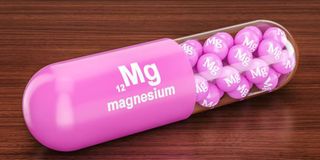Why magnesium is the miracle supplement of our time

Magnesium helps to relax muscles and prevents the build-up of lactic acid, which, along with muscle tension, can worsen head pain. PHOTO| POOL
What you need to know:
- From aches and pains to insomnia and even migraines, I don’t think it would be a stretch to say that magnesium truly is the miracle mineral.
- When magnesium levels are low, it can’t do its job to counteract the clotting action of the calcium.
- The best dietary sources are nuts, especially almonds and cashews, dark green vegetables such as sukumawiki and whole grains and pulses.
For those of you who’ve watched My Big Fat Greek Wedding, you’ll remember the dad who always sprays Windex on everything. He believes that any ailment can be cured with Windex. Well, that’s exactly how I feel about magnesium. From aches and pains to insomnia and even migraines, I don’t think it would be a stretch to say that magnesium truly is the miracle mineral.
The most common problem I hand magnesium out for, is headaches and migraines. Generally, it’s a magnesium deficiency that sets the stage for the events that can cause migraines or a tension headache. When magnesium levels are low, it can’t do its job to counteract the clotting action of the calcium.
Blood circulation
Tiny blood clots then clog up the tiny blood vessels in the brain, and that’s what leads to a migraine. Supplementing with magnesium not only helps to stop this process, it also relaxes blood vessels. Magnesium also helps to relax muscles and prevents the build-up of lactic acid, which, along with muscle tension, can worsen head pain.
And that brings me to the second reason I love magnesium: its ability to relieve muscle pain. In the case of magnesium deficiency nerve cells become over stimulated and transmit lots of signals to muscles. This results in too much muscle contraction and symptoms such as muscle tension and cramps. When supplemented, magnesium works by operating as a barrier, preventing calcium from entering a nerve cell and activating it in the first place.
Muscle-relaxing
This muscle-relaxing property is what makes magnesium so useful in helping asthmatics. By helping the bronchial muscles to relax and encouraging the lung's airways to expand, magnesium has been shown to help ease an asthmatic's breathing problems. The muscle-relaxing quality can also help alleviating the symptoms of PMS. Magnesium works by lowering levels of hormone-like substances called prostaglandins, which cause cramping. It also helps to improve symptoms such as mood changes and fluid retention.
Athletes stand to benefit too; magnesium’s role in energy production is critical. It is actively involved as a co-factor in every single step in the production of ATP (considered the “energy currency” of the cell) and it facilitates the delivery of oxygen to working muscle tissue
Prevent serious illnesses
And I could go on: diabetes, high cholesterol, hypertension, osteoporosis, kidney stones, and chronic fatigue are all ailments that could benefit.
The best dietary sources are nuts, especially almonds and cashews, dark green vegetables such as sukumawiki and whole grains and pulses. With the nutrient depleted soils that we now have, supplementing is definitely worthwhile (approx. 300mg daily).
Feedback: [email protected]




